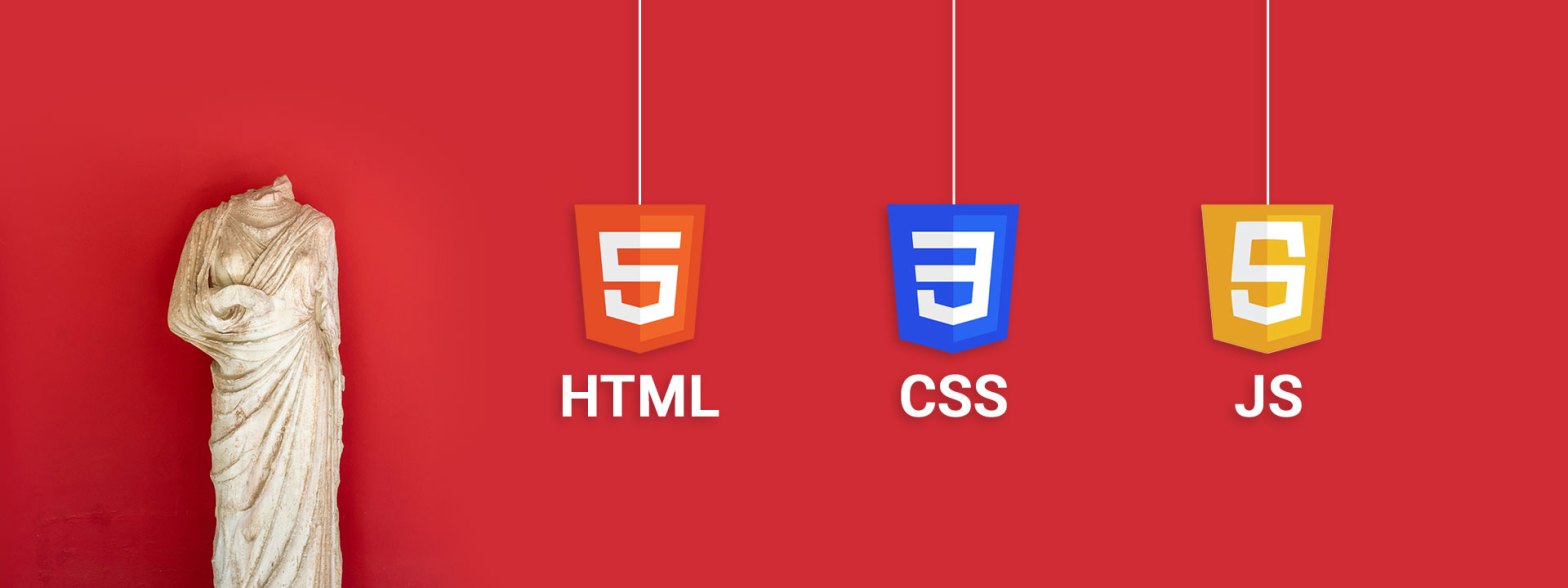
Top 8 Headless eCommerce Platforms & Selection Criterion.
![]() Taru M.
Taru M.
Published: 31 May, 2022
With Headless eCommerce platforms, businesses can deliver unique and phenomenal user experiences on multiple devices. It is because developers are not limited to out-of-box features of a specific platform. The presentation layer or front-end is decoupled with the back-end, therefore you can craft unique user experiences using frameworks of your choice.
Successful and large eCommerce companies are already shifting to MACH (Microservice, API, Cloud, Headless) architecture. You can take inspiration from these headless commerce examples. Though, earlier it was assumed that only large companies can afford to go pure headless. But the long-term benefits of headless commerce outweigh the initial investment. As a result, SMEs too are boldly embracing future-proof technologies.
It can be difficult to decide on one perfect platform over another with so many options available. To help you select the near-perfect headless commerce platform, we have outlined the selection criterion, and have curated the best headless eCommerce platforms to save your time and cognitive energy. We will talk about the following platforms:
1. Commercetools
2. BigCommerce
3. Shopify Plus
4. Magento
5. OpenCart
6. Contentful
7. Craft Commerce
8. Oro Commerce
Selection Criterion for Headless eCommerce Platforms.
1. API
- The API responses should be swift. ‘Cause, it is through the API that headless commerce fetches content to display on devices by total decoupling with the presentation layer.
- The communication using GraphQL is faster than other APIs. So, ideal Headless CMS must support GraphQL API.
- The API should not use multiple requests for a single task i.e. it shouldn’t fetch too much or incomplete data.
- Clear and simple API documentation will facilitate ease in learning and improved performance.
2. Content Management if you combine a headless e-commerce platform with headless CMS
- Content authors must find writing and editing experience flawless. But make sure there is no overuse of WYSIWYG editors.
- There should be systems for reusing data at the granular level. It will ensure content is delivered in a format compatible with multiple devices.
- A good headless CMS limit its API depth in a way so that no circular references to content can be created. Or it offers visualisations so that they can be easily detected.
- Images and videos are not only data-intensive but they require proper organisation. Additionally, for fast performance, headless commerce should use CDN (Content Delivery Network) servers.
3. Other crucial parameters
- Back-ups are the saviour. But it must always be easy to restore back-ups.
- As data privacy in eCommerce is the highest priority. So, ensure your preferred headless commerce platform has modules for data encryption, GDPR (General Data Protection Regulation), and US privacy compliances.
- A headless eCommerce platform without any comprises must offer an agile workflow.
- It must seamlessly integrate with other platforms like React JS, Angular, Gatsby, Next.JS etc.
- And finally, responsive and empathetic customer support.
These 8 best Headless eCommerce Platforms will push growth and handle huge traffic.
1. Commercetools
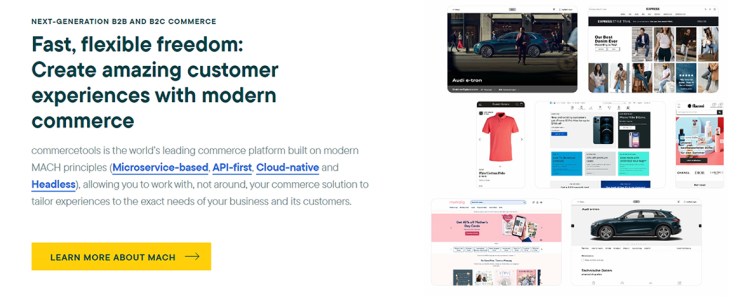
- Commercetools is a cloud-native headless commerce platform. It is in the industry for a long time now and sort of started the headless commerce solutions.
- It is truly robust and allows for flexible microservices. Their clients include Audi, AT&T, Bang & Olufsen, etc.
- The onboarding experience is well-planned and meaningful.
- As mentioned in the selection criterion, Commercetools has well-documented APIs. The GraphAQL support is extensive and its RESTful APIs ensure nice productivity and performance.
- You can build amazing B2B solutions and provide personalized experiences like B2C commerce offers.
- Although you can deploy starter templates to get going, you too know that those are not enough customizable. Moreover, the purpose of the headless commerce platform is to provide flexibility so that eCommerce businesses can create customisable commerce solutions.
- Smooth integration with Contentstack, Magnolia CMS, Vue.JS, React.JS, CyberSource, etc allows businesses to choose their reliable platforms to build exceptional User Experiences.
2. BigCommerce
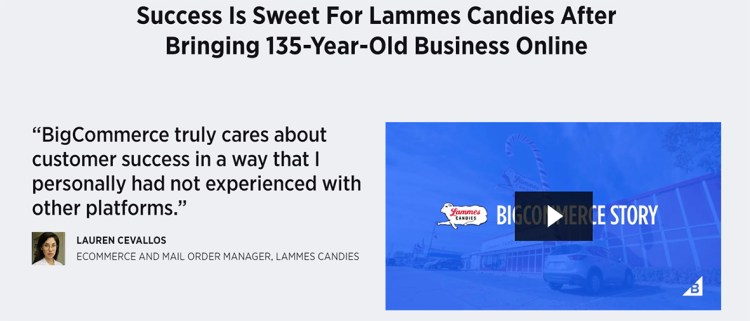
- BigCommerce is a noted SaaS eCommerce platform. As you would expect with a leading eCommerce platform, it provides efficient inventory management, payment gateways and shipping methods.
- You can abandon the monolithic system and move to the headless way with BigCommerce. The eCommerce businesses cherish the flexibility and can build fantastic customer engagement.
- By decoupling with the view or presentation layer, you can choose any front-end framework of your choice like Next.js if you are inclined towards React.js, Gatsby.js to develop PWA version, Nuxt.js for Vue developers, etc.
- Besides opting for the front-end of your choice, there is flexibility over CMS as well. Some of the options are WordPress, Prismic and Contentstack.
- One of their clients K2 sports improved its productivity by 50% and published content 90% rapidly when they committed to headless commerce.
- Currently, you can create 600 SKU for your single product. The monolithic BigCommerce may slow down when the eCommerce websites become complex and huge.
- It is lightweight. You can customize URLs and have access to robot.txt file that may help in SEO, and consequently generate more traffic.
- You can pick secure payment and shipping providers of your choice. For many eCommerce businesses, managing sales tax is boring and time-consuming. With BigCommerce, you can integrate with the best automatic sales tax software. On top of that, you can sell products in different currencies.
- BigCommerce doesn’t provide options for shipping discounts. Quite many users feel pre-built themes are boring and don’t suit their brands’ personalities.
- Also, templates and email features require knowledge of HTML to modify them.
3. Shopify Plus
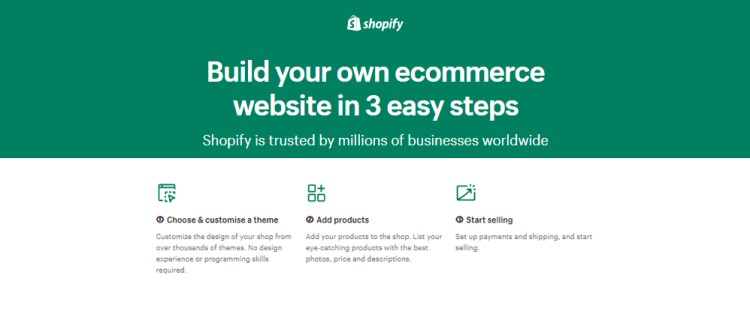
- An open-source headless eCommerce and marketplace giant Shopify offers APIs and cloud storage solutions that give eCommerce business owners access to store data, edit inventories, create products, upload media files, etc.
- With headless Shopify, you can create selling points for multiple touchpoints like mobile apps, wearables, video games, web apps, etc.
- Go for your preferred tools and platforms for ERP (Enterprise Resource Planning), PIM (Product Information Management), CRM(Customer Relationship Management), CMS (Content Management System), and DXP (Digital Experience Platforms). To get a hang of the most used terms in the eCommerce industry, Read our blog 51 concepts.
- You can automate workflows with ready-to-use scripts. With automation, it is easy and fast to develop personalized shopping experiences. You can reward customers, offer discounts, notify them about low stocks, etc by analysing their spending habits.
Are you looking for a modern and reliable development company for eCommerce solutions? Then we will love it if you explore our web and app projects, and contact us for Shopify development services.
4. Magento
- If you want a professional platform designed from its core to work as an online store, you might want to consider Magento.
- This open-source software is one of the most popular solutions and has a pretty impressive feature set.
- Because it’s complex, Magento is not necessarily ideal for small business owners on a budget—and even many professionals say they avoid Magento because of its learning curve and overkill functionality. However, if you need powerful customization options and are planning to grow your business quickly over time, then Magento could be well worth it in terms of ROI.
- Confused between Shopify and Magento. Read Shopify vs Magento.
5. OpenCart
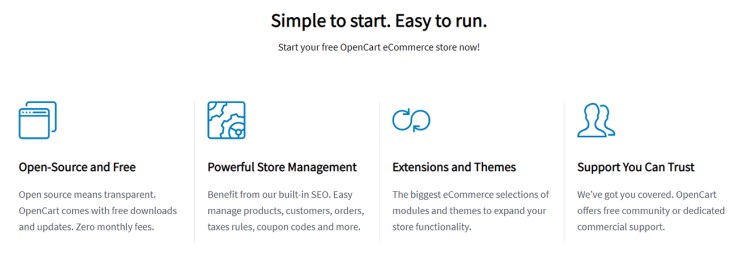
- This open-source headless eCommerce platform helps you manage orders and inventory from start to finish.
- From its mobile-friendly, responsive design to multiple shipping options and advanced security features, OpenCart has all your e-commerce needs covered. It also comes with more than 200 payment gateways, including PayPal and Amazon Pay, ensuring your customers can use their preferred payment method.
- OpenCart boasts a community that’s constantly innovating by sharing plugins and themes designed specifically for it. So you always have access to features like email marketing tools and social media integrations.
- Its API lets you easily integrate third-party apps or connect with accounting software like QuickBooks or Xero.
6. Contentful
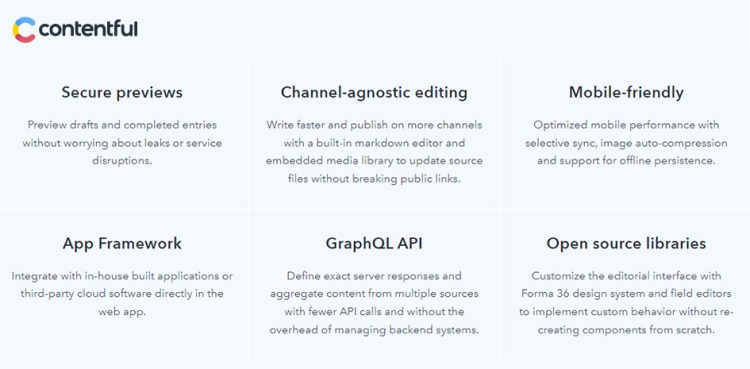
- It is the best open-source headless commerce, according to eMarketer. Contentful is a content platform providing an open-source API.
- It supports JSON, YAML, Markdown, and HTML input formats with a large selection of ready-made features and enterprise tools you can use to publish rich content with ease.
- You can pick either their free plan or one of their paid plans based on your size, revenue, and goals as a company. Their documentation is detailed and well-written.
- With Contentful, you can get started in minutes without any coding knowledge required, thanks to its web interface, which allows you to customize fields and structure your data as needed.
- The flexible nature of Contentful’s technology also means it’s easy to integrate third-party apps like Google Analytics or MailChimp for tracking purposes.
7. Craft Commerce
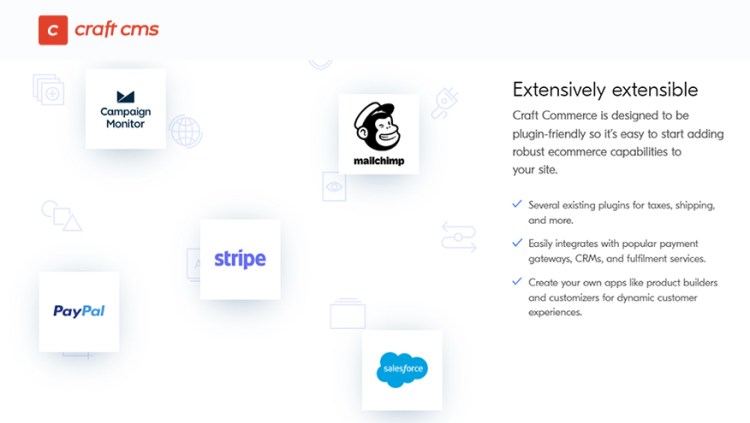
- Craft is a lightweight headless eCommerce platform that makes it easy to create powerful bespoke eCommerce channels.
- Craft allows developers to create custom products, categories, and pages, use nested attributes, and define variable pricing on products.
- Headless Craft CMS uses Element API ( RESTful API) and CraftQL ( a GraphQL implementation). It offers no themes, therefore every online store designed via Craft Commerce is unique.
- Its plugin support is extensive and you can use them for taxes, payment gateways, CRM, shipping, etc. Integrate quickly with Klaviyo Connect, Stripe, ShipStation Connect, etc
8. OroCommerce
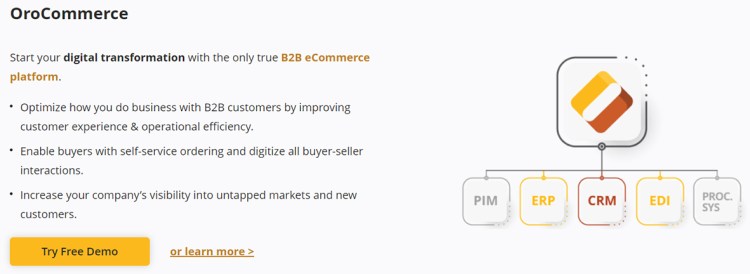
- Oro is a headless eCommerce platform built on top of Drupal. It utilizes all of Drupal’s strengths and robust feature sets.
- In addition to offering a headless platform, Oro offers powerful out-of-the-box features that provide standard capabilities in popular headless commerce platforms today, such as content management, marketing, analytics, and more.
- Oro provides a well-rounded, out-of-the-box solution that requires no additional plugins or add-ons but can be extended with other community or commercial modules.
- The level of integration with Drupal also allows you to leverage all your existing investments in user/editor training while delivering an end product that looks very familiar to your team.
When you should consider a Headless eCommerce solution?
If your business goals require delivering content on various channels like AR, wearables, mobile phones, and voice-enabled devices. Then you should choose to harness the power of headless commerce platforms.
Microservice architecture demand is growing. And headless platforms utilise it. Hence, it is a wise approach to adopt advanced architecture for your online business.
Modern customers’ demands and expectations are getting more subtle. Technologists devise exciting tools like VR, AR, etc. to engage customers. Therefore, to satisfy your customers, your eCommerce business must be flexible and swift to integrate these new technologies.
With traditional CMS, you are limited to ‘Waterfall Workflow’ i.e. linear flow. This seriously slows down the development process. On the contrary, headless commerce offers space for ‘Agile Workflow’. With it, businesses use an iterative approach to swiftly develop features according to users’ needs.
Our company has solid experience in both designing and developing eCommerce websites and apps. We keep ourselves updated with the latest tech stack to deliver robust and quick eCommerce web and mobile apps. Take our eCommerce development services and build your dream project with us.
Copyright © 2023 NetMaxims Technologies Pvt. Ltd.
All Rights Reserved














